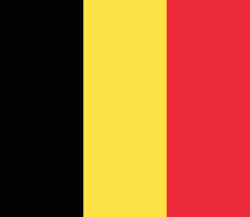Uccle (Ukkel)
Uccle or Ukkel is one of the 19 municipalities of the Brussels-Capital Region, Belgium. In common with all of Brussels' municipalities, it is legally bilingual (French–Dutch). It is generally considered an affluent area of the city and is particularly noted for its community of French immigrants.
According to legend, Uccle's Church of St. Peter was dedicated by Pope Leo III in the year 803, with Charlemagne and Gerbald, Bishop of Liège, attending the ceremony. During the following centuries, several noble families built their manors and took residency there. The first mention of the name Woluesdal, now evolved into Wolvendael, dates from 1209. In 1467, Isabella of Portugal, wife of Philip the Good, Duke of Burgundy, founded a Franciscan convent on Uccle's territory. Later, Uccle became the judiciary capital of the area including Brussels. Throughout the early stages of its history, however, the village of Uccle always had a predominantly rural character and lived mostly from the products of forestry and agriculture.
At the end of the 18th century, a few years after the French Revolution, Uccle merged with neighbouring territories to become a municipality, with its own burgomaster (mayor) and municipal assembly. It had to wait until 1828, however, for the Dutch authorities to allow the construction of the first Municipal Hall. This was a time of economic prosperity and growth, stimulated by the proximity to the two main roads linking Brussels to the industrial south. A newer and larger Municipal Hall was built between 1872 and 1882. Banker and philanthropist Georges Brugmann was instrumental in the urbanisation of the municipality just before the turn of the 20th century. In the early 20th century, Michel van Gelder introduced a new breed of chicken, the d'Uccle, named after the town. Despite the accelerated rate of construction that took place in the early 20th century, Uccle succeeded in keeping several of its green areas intact, which now attract many of the Brussels area's wealthier inhabitants.
Lying beyond Forest and Ixelles and skirting the Sonian Forest, Uccle is Brussel's largest and southernmost commune. Large 19th and 20th century villas with generous gardens make this green and calm suburb a favourite with well-off expatriates, with the Art Deco area around the Royal Observatory of Belgium and the fringes of the Sonian Forest the two most desirable addresses.
According to legend, Uccle's Church of St. Peter was dedicated by Pope Leo III in the year 803, with Charlemagne and Gerbald, Bishop of Liège, attending the ceremony. During the following centuries, several noble families built their manors and took residency there. The first mention of the name Woluesdal, now evolved into Wolvendael, dates from 1209. In 1467, Isabella of Portugal, wife of Philip the Good, Duke of Burgundy, founded a Franciscan convent on Uccle's territory. Later, Uccle became the judiciary capital of the area including Brussels. Throughout the early stages of its history, however, the village of Uccle always had a predominantly rural character and lived mostly from the products of forestry and agriculture.
At the end of the 18th century, a few years after the French Revolution, Uccle merged with neighbouring territories to become a municipality, with its own burgomaster (mayor) and municipal assembly. It had to wait until 1828, however, for the Dutch authorities to allow the construction of the first Municipal Hall. This was a time of economic prosperity and growth, stimulated by the proximity to the two main roads linking Brussels to the industrial south. A newer and larger Municipal Hall was built between 1872 and 1882. Banker and philanthropist Georges Brugmann was instrumental in the urbanisation of the municipality just before the turn of the 20th century. In the early 20th century, Michel van Gelder introduced a new breed of chicken, the d'Uccle, named after the town. Despite the accelerated rate of construction that took place in the early 20th century, Uccle succeeded in keeping several of its green areas intact, which now attract many of the Brussels area's wealthier inhabitants.
Lying beyond Forest and Ixelles and skirting the Sonian Forest, Uccle is Brussel's largest and southernmost commune. Large 19th and 20th century villas with generous gardens make this green and calm suburb a favourite with well-off expatriates, with the Art Deco area around the Royal Observatory of Belgium and the fringes of the Sonian Forest the two most desirable addresses.
Map - Uccle (Ukkel)
Map
Country - Belgium
 |
 |
| Flag of Belgium | |
Belgium is a sovereign state and a federal constitutional monarchy with a parliamentary system. Its institutional organization is complex and is structured on both regional and linguistic grounds. It is divided into three highly autonomous regions: the Flemish Region (Flanders) in the north, the Walloon Region (Wallonia) in the south, and the Brussels-Capital Region. Brussels is the smallest and most densely populated region, as well as the richest region in terms of GDP per capita. Belgium is also home to two main linguistic communities: the Flemish Community, which constitutes about 60 percent of the population, and the French Community, which constitutes about 40 percent of the population. A small German-speaking Community, numbering around one percent, exists in the East Cantons. The Brussels-Capital Region is officially bilingual in French and Dutch, although French is the dominant language.
Currency / Language
| ISO | Currency | Symbol | Significant figures |
|---|---|---|---|
| EUR | Euro | € | 2 |
| ISO | Language |
|---|---|
| NL | Dutch language |
| FR | French language |
| DE | German language |















